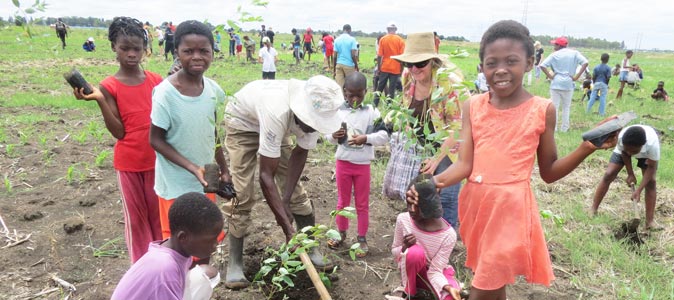
Dzivaresekwa 3 residents in Harare are resisting a reforestation and land rehabilitation project in the area.
REPORT BY CHRISTOPHER MAHOVE
A social welfare organisation is facing opposition after it signed a 25-year lease agreement that will result in 10 000 trees being planted on the 60-hectare stretch of land.
Dzikwa Trust Fund, which provides basic education and general welfare to more than 400 orphans in the area, signed the lease agreement with council on March 16 this year, to allow it to venture into agro-forestry, where they would plant various types of trees, including fruit trees.
But residents have expressed their reservations over the project, saying the land in question forms their maize fields, which they have been tilling for the past 30 years or more, and have threatened to uproot the trees, should they ever be planted.
The residents, from both the MDC-T and Zanu PF parties, formed an alliance against the Dzikwa Trust Fund and its programme director, Seppo Ainamo.
They recently stormed out of a meeting held at the centre to try and resolve the matter. The residents, most of whom claimed they depended on the piece of land for their staple maize, said they would do everything to ensure the project did not go ahead, even if it meant their children lost the scholarships being offered by the Trust.
“We don’t need this organisation here. This land has been our livelihood since we started living here and we can’t afford to lose it now. If Ainamo wants to approach the minister [Francis Nhema], he should go ahead. Let the minister come here and we will deal with him,” said one resident, who is also a member of the Zimbabwe National Army, on condition of anonymity.
- Bullets shoot down Chiefs
- Tenax finally remember how to win
- Yadah’s good run continues
- May Day, May Day, Caps in trouble!
Keep Reading
Another resident, only identified as Mai Malindima, said Ainamo should concentrate on assisting vulnerable children and not meddle in land issues.
“We will uproot the trees if they dare plant them against our will. We rely on that land for survival and we will not allow him to take it away from us,” she said.
Ainamo, however, was determined that the project would go on, saying it had the blessings of Environment and Natural Resources minister Francis Nhema and the Parliament.
“Our lease runs until 2037 and we were invited to do forestry with the full support of the minister [Nhema] and we know that the parliament is in favour [of the project]. So we are actually surprised by the outcome of this meeting,” Ainamo said.
“We had engaged a specialist in Agro-forestry and we planned to introduce pigeon peas to enrich the land with nitrogen. It will not be the end of my world if we are stopped from carrying out this project,” he said.
He, however, expressed hope that the trust could make a friendly arrangement with the involved families, provided “there is no political agitation”.
Initiative can uplift livelihoods: Gwande Environmentalist, Kudzanayi Gwande, who had been invited to explain the benefits of the projects to the residents, but could not do so after residents walked out, said the community was frustrating a very good project.
“It is a very good project, but must exist together with the community. If you plant trees such as Mutsangu, which was voted tree of the year, it has the potential to put up to 200 kilogrammes of compound D fertiliser into the soil and that would be good for farmers in view of the shortages.
“But the residents became militant before we could start explaining to them the benefits of the project,” he said.
Gwande said the plantation could also be an income-generating project for youths and women, who could be trained to venture into timber selling.
He said he was doing his best to support the community, spending more then US$5 million per year in school fees and projects for disadvantaged children, adding the project would in the long run, also benefit the same community.
More families, he said, would benefit from the plantation project than those who were farming on the piece of land.











